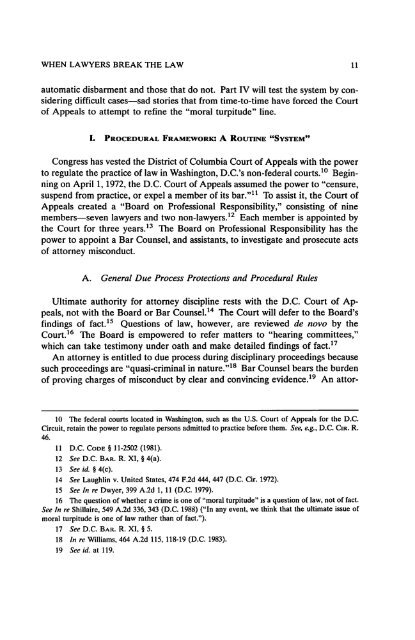WHEN LA WYERS BREAK THE LAW 11automatic disbarment and those that do not. Part IV will test <strong>the</strong> system by consideringdifficult cases-sad stories that from time-to-time have forced <strong>the</strong> Court<strong>of</strong> Appeals to attempt to refine <strong>the</strong> "moral turpitude" line.I. PROCEDURAL FRAMEWORK: A ROUTINE "SYSTEM"Congress has vested <strong>the</strong> <strong>District</strong> <strong>of</strong> <strong>Columbia</strong> Court <strong>of</strong> Appeals with <strong>the</strong> powerto regulate <strong>the</strong> practice <strong>of</strong> law in Washington, D.C.'s non-federal courts. 10 Beginningon April 1, 1972, <strong>the</strong> D.C. Court <strong>of</strong> Appeals assumed <strong>the</strong> power to "censure,suspend from practice, or expel a member <strong>of</strong> its bar."11 To assist it, <strong>the</strong> Court <strong>of</strong>Appeals created a "Board on Pr<strong>of</strong>essional Responsibility," consisting <strong>of</strong> ninemembers-seven lawyers and two non-lawyers. 12 Each member is appointed by<strong>the</strong> Court for three years. 13 <strong>The</strong> Board on Pr<strong>of</strong>essional Responsibility has <strong>the</strong>power to appoint a Bar Counsel, and assistants, to investigate and prosecute acts<strong>of</strong> attorney misconduct.A. General Due Process Protections and Procedural RulesUltimate authority for attorney discipline rests with <strong>the</strong> D.C. Court <strong>of</strong> Appeals,not with <strong>the</strong> Board or Bar Counsel. 14 <strong>The</strong> Court will defer to <strong>the</strong> Board'sfindings <strong>of</strong> fact. IS Questions <strong>of</strong> law, however, are reviewed de novo by <strong>the</strong>Court. 16 <strong>The</strong> Board is empowered to refer matters to "hearing committees,"which can take testimony under oath and make detailed findings <strong>of</strong> fact. I ?An attorney is entitled to due process during disciplinary proceedings becausesuch proceedings are "quasi-criminal in nature."18 Bar Counsel bears <strong>the</strong> burden<strong>of</strong> proving charges <strong>of</strong> misconduct by clear and convincing evidence. 19 An attor-10 <strong>The</strong> federal courts located in Washington, such as <strong>the</strong> U.S. Court <strong>of</strong> Appeals for <strong>the</strong> D.C.Circuit, retain <strong>the</strong> power to regulate persons admitted to practice before <strong>the</strong>m. See, e.g., D.C. CIR. R.46.11 D.C. CODE § 11-2502 (1981).12 See D.C. BAR. R. XI, § 4(a).13 See id. § 4(c).14 See Laughlin v. United States, 474 F.2d 444, 447 (D.C. Cir. 1972).15 See In re Dwyer, 399 A.2d I, 11 (D.C. 1979).16 <strong>The</strong> question <strong>of</strong> whe<strong>the</strong>r a crime is one <strong>of</strong> "moral turpitude" is a question <strong>of</strong> law, not <strong>of</strong> fact.See In re Shillaire, 549 A.2d 336, 343 (D.C. 1988) ("In any event, we think that <strong>the</strong> ultimate issue <strong>of</strong>moral turpitude is one <strong>of</strong> law ra<strong>the</strong>r than <strong>of</strong> fact.").17 See D.C. BAR. R. XI, § 5.18 In re Williams, 464 A.2d 115, 118-19 (D.C. 1983).19 See id. at 119.
12 THE UNIVERSITY OF THE DISTRICf OF COLUMBIA LAW REVIEWney is entitled to notice <strong>of</strong> <strong>the</strong> charges against him.2o However, attorneys are notipso facto entitled to every protection that a criminal defendant receives. 21<strong>The</strong>re is no statute <strong>of</strong> limitations for <strong>the</strong> institution <strong>of</strong> disciplinary proceedings.22 <strong>The</strong> purpose <strong>of</strong> disciplinary rules is not simply to punish attorneys, but toalso protect clients and society.23 "[A]n attorney is in a continuing position <strong>of</strong>trust toward clients, <strong>the</strong> courts, and society in general. ,,24 Accordingly, bar certificationis also a continuing process.B. Procedure Upon Conviction <strong>of</strong> a Crime<strong>The</strong> procedure upon an attorney's conviction <strong>of</strong> a crime is governed by D.C.Code § 11-2503(a) and Section 10 <strong>of</strong> Rule XI <strong>of</strong> <strong>the</strong> <strong>District</strong> <strong>of</strong> <strong>Columbia</strong> BarRules. D.C. Code § 11-2503 provides in pertinent part:(a) When a member <strong>of</strong> <strong>the</strong> bar <strong>of</strong> <strong>the</strong> <strong>District</strong> <strong>of</strong> <strong>Columbia</strong> Court <strong>of</strong> Appealsis convicted <strong>of</strong> an <strong>of</strong>fense involving moral turpitude, and a certifiedcopy <strong>of</strong> <strong>the</strong> conviction is presented to <strong>the</strong> court, <strong>the</strong> court shall, pendingfinal determination <strong>of</strong> an appeal from <strong>the</strong> conviction, suspend <strong>the</strong> member<strong>of</strong> <strong>the</strong> bar from practice. Upon reversal <strong>of</strong> <strong>the</strong> conviction <strong>the</strong> court mayvacate or modify <strong>the</strong> suspension. If a final judgment or conviction is certifiedto <strong>the</strong> court, <strong>the</strong> name <strong>of</strong> <strong>the</strong> member <strong>of</strong> <strong>the</strong> bar so convicted shall bestruck from <strong>the</strong> roll <strong>of</strong> <strong>the</strong> members <strong>of</strong> <strong>the</strong> bar and such person shall <strong>the</strong>reaftercease to be a member. Upon <strong>the</strong> granting <strong>of</strong> a pardon to a member soconvicted, <strong>the</strong> court may vacate or modify <strong>the</strong> order <strong>of</strong> disbarment.Section 10 <strong>of</strong> Rule XI <strong>of</strong> <strong>the</strong> <strong>District</strong> <strong>of</strong> <strong>Columbia</strong> Bar Rules specifies <strong>the</strong> proceduresto be followed upon an attorney's conviction <strong>of</strong> a crime. Upon receipt <strong>of</strong>a certified copy <strong>of</strong> a record demonstrating that an attorney has been convicted <strong>of</strong>a "serious crime," <strong>the</strong> Court <strong>of</strong> Appeals immediately suspends an attorney frompractice. 25 If <strong>the</strong> crime is not "serious," Bar Counsel may institute charges <strong>of</strong>misconduct. If <strong>the</strong> crime is "serious," <strong>the</strong> only question to be answered by <strong>the</strong>Court is <strong>the</strong> "nature <strong>of</strong> <strong>the</strong> final discipline to be imposed. ,,2620 See In re Washington, 513 A.2d 245 (D.C. 1986). "It is elementary that a fundamental requirement<strong>of</strong> due process is notice that apprises <strong>the</strong> interested parties <strong>of</strong> <strong>the</strong> pendency <strong>of</strong> <strong>the</strong> actionand affords <strong>the</strong>m an opportunity to present <strong>the</strong>ir objections. . . . <strong>The</strong> same principles apply to disbarmentproceedings." In re Colson, 412 A.2d 1160, 1164 (D.C. 1979).21 See In re Williams, 513 A.2d 793, 796 (D.C. 1986).22 See D.C. BAR. R. XI, § 1(c). However, in Williams <strong>the</strong> Court cautioned that Bar Counsel'sunjustified delay in instituting disciplinary charges that later results in prejudice to <strong>the</strong> attorney couldconstitute a due process violation. See Williams, 513 A.2d at 797.23 See id. at 795 ("<strong>The</strong> disciplinary rules protect clients from wayward attorneys, maintain <strong>the</strong>integrity and competence <strong>of</strong> <strong>the</strong> legal pr<strong>of</strong>ession, and save <strong>the</strong> judicial process from corruption.").24 Id. at 796.25 See D.C. BAR R. XI, § 10(c).26 See id. § 1O( d).














